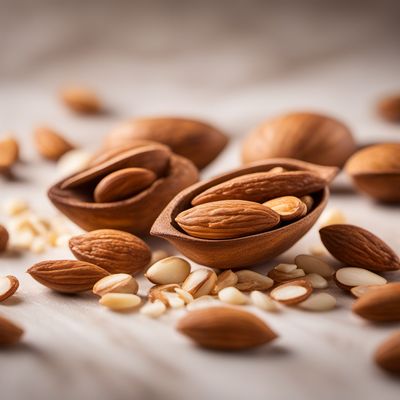
Ingredient
Lemon essence
The Essence of Citrus: Lemon Essence and its Intense Flavor
Lemon essence is a highly concentrated liquid derived from lemon zest or lemon oil. It has a strong, tangy flavor that captures the essence of fresh lemons. Lemon essence is clear or pale yellow in color and is often used in small quantities to enhance the lemon flavor in recipes. It is commonly used in baking cakes, cookies, and pastries, as well as in making lemon-flavored beverages.
Origins and history
The use of lemon essence dates back to ancient times when lemons were prized for their medicinal properties and culinary versatility. The extraction of lemon essence allowed for the preservation and intensification of the lemon flavor, making it a valuable ingredient in various cuisines. Today, lemon essence continues to be widely used in baking and confectionery.
Nutritional information
Lemon essence is low in calories and does not provide significant nutritional value. It is primarily used for its flavoring properties rather than its nutritional content.
Allergens
There are no known allergens associated with lemon essence.
How to select
When selecting lemon essence, opt for high-quality brands that use natural lemon extracts without artificial additives or preservatives. Look for products that clearly state the percentage of lemon oil or extract used. Additionally, consider purchasing small bottles to ensure freshness and prevent waste.
Storage recommendations
To maintain the freshness and potency of lemon essence, store it in a cool, dark place away from direct sunlight. Properly stored lemon essence can retain its flavor for up to one year. Avoid exposing it to heat or moisture, as this can degrade the quality of the product.
How to produce
Lemon essence is produced through a process of extracting the essential oils from lemon zest or lemon oil. This extraction can be done at home by steeping lemon zest in a high-proof alcohol, such as vodka, and allowing it to infuse for several weeks. The resulting liquid can then be strained and used as homemade lemon essence.
Preparation tips
Lemon essence is typically used in baking recipes to enhance the lemon flavor in cakes, cookies, muffins, and pastries. It can also be added to frostings, glazes, and fillings to provide a burst of citrusy goodness. Lemon essence is commonly used in lemon bars, lemon meringue pie, and lemon-flavored beverages like lemonade or cocktails.
Substitutions
Fresh lemon zest or lemon juice can be used as substitutes for lemon essence, although they may not provide the same concentrated flavor. Lemon extract, which is similar to lemon essence but less potent, can also be used as a substitute. Adjust the quantity according to taste.
Culinary uses
Lemon essence is widely used in baking and confectionery, particularly in recipes that require a strong lemon flavor. It is a key ingredient in lemon cakes, lemon cookies, lemon tarts, and lemon-flavored candies. Lemon essence is also used to flavor beverages like lemonade, cocktails, and sorbets.
Availability
Lemon essence is commonly available in grocery stores, baking supply stores, and online retailers. It is a popular ingredient in many countries, including the United States, United Kingdom, and Australia.
More ingredients from this category

Anise extract
The Aromatic Elixir: Unveiling the Delights of Anise Extract

Orange essence
The Essence of Citrus: Unlocking the Aromatic Delights of Orange Essence

Almond essence
The Essence of Almonds

Liquorice extract
The Sweet and Earthy Allure of Liquorice Extract

Vanilla essence
The Aromatic Elixir: Unveiling the Magic of Vanilla Essence

Rum essence
The Essence of Caribbean Spirit